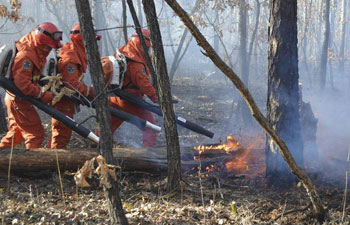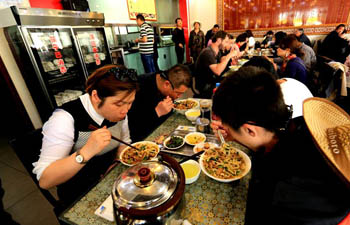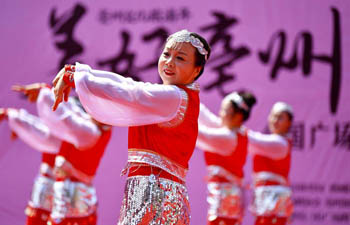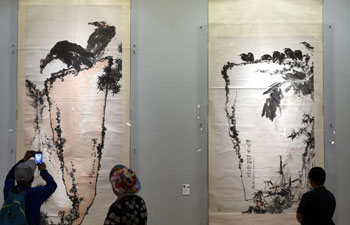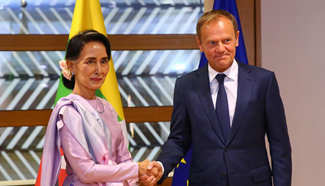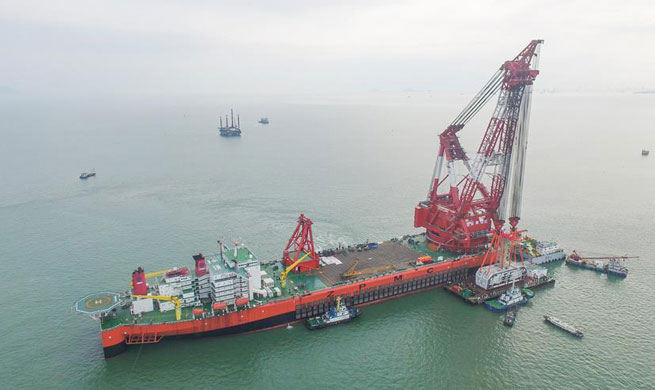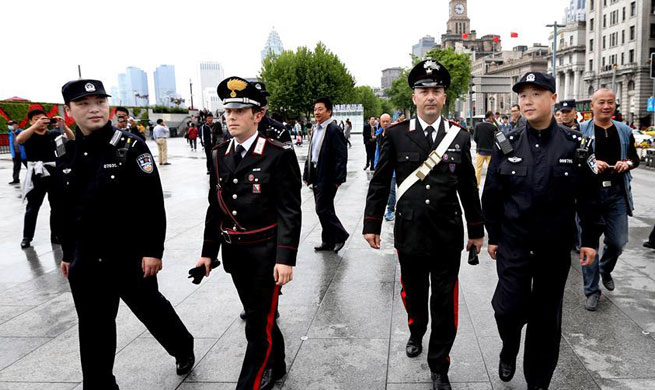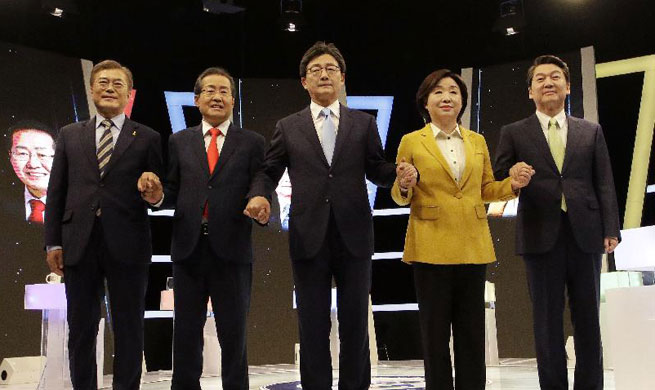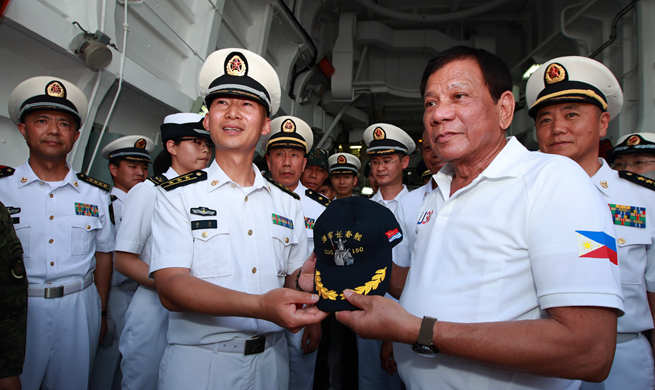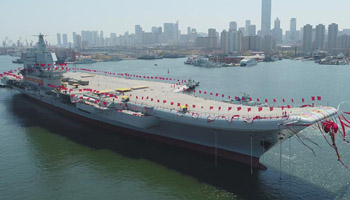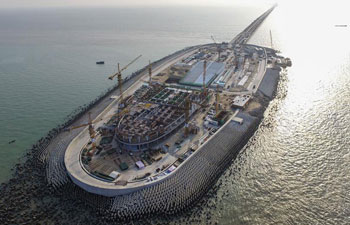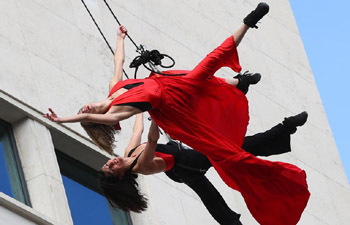by Stefania Fumo
ROME, May 2 (Xinhua) -- The controversy over the role of non-governmental organizations in rescuing migrants in the Mediterranean heated up Tuesday as humanitarian outfits defended themselves from incendiary rhetoric from right-wing politicians in Italy.
"Some aren't volunteers, but are making money off these wretches," said Matteo Salvini, chief of the right-wing anti-immigrant Northern League party. "Someone is in the (human) traffickers' pocket, someone is engaging in ethnic cleansing in both Africa and Italy."
Salvini spoke in the Sicilian city of Catania, where local prosecutor Carmelo Zuccaro alleged on national television that some humanitarian NGOs "could be financed by human traffickers -- I know there have been contacts."
Speaking on Agora talk show on RAI public broadcaster last week, Zuccaro said the aim could be "to destabilize the Italian economy," suggesting that human traffickers are in direct contact with some NGO vessels off the coast of Libya.
He later conceded his comments were "hypothetical" and that "in theory, I should investigate first and then speak out."
Lower House Deputy Speaker Luigi Di Maio -- who is from the populist Five Star Movement and its likely candidate for prime minister in the next general election -- jumped onto the bandwagon, saying that NGOs are acting as "migrant taxis".
The NGOs, he said, must answer to "extremely grave accusations" from both EU border agency Frontex and the Catania prosecutor of being "in cahoots with human traffickers... and of transporting criminals."
Di Maio cited the Frontex 2017 Risk Analysis report, which noted that "all parties involved in search-and-rescue operations (including Frontex and other EU missions) in the Central Mediterranean unintentionally help criminals achieve their objectives at minimum cost (and) strengthen their business model by increasing the chances of success."
The agency concluded that "search-and-rescue efforts will continue as long as the migratory crisis persists in the Central Mediterranean not only because they relate to international legal obligations, but also because they stem from European values."
Crusading anti-mafia journalist Roberto Saviano, who lives under round-the-clock police protection due to death threats from organized crime, took aim at Di Maio for his comments on Tuesday.
"The protagonist of the controversy... is speaking tomorrow at Harvard," Saviano wrote on Facebook, suggesting that a topic of his talk could be how fomenting "a culture of suspicion and cynicism... can produce a despicable blend of misinformation and racism, the victims of which are the last, the weak."
"The damage done to the volunteer sector by the irresponsibility of those hiding behind hypocrites is already enormous," Saviano added, saying the rhetoric has unleashed a slew of "comments full of hate and prejudice" against such organizations as UNICEF and Doctors Without Borders.
"Mustn't forget the absolute priority of every activity at sea: to save human lives," UNHCR Italy tweeted Tuesday.
"Insulting and vilifying humanitarian organizations means throwing tens of thousands of people into the arms of death," Amnesty International Italy director Gianni Rufini told public news broadcaster RAI News 24.
The attacks on NGOs "are a cover-up for Europe's incapacity to take on responsibility," Rufini said.
Frontex operations are moving further and further away from the migrant boat route where most shipwrecks occur, and humanitarian organizations have stepped in to fill that void, he said.
His words were echoed by Doctors Without Borders Italy chief Loris De Filippi, who told the Senate Defence Committee on Tuesday that "European policies, not humanitarian organizations, are favoring human traffickers."
The committee has summoned Italian officials as well as NGOs to a series of hearings this week in an effort to shed light on the allegations.
Like many humanitarian organizations, De Filippi called for safe, legal channels for migrants and asylum seekers fleeing war zones in Africa and the Middle East as the only way to defeat human traffickers.
Also on Tuesday, Prosecutor Francesco Paolo Giordano from the Sicilian city of Siracusa told the committee that his office has no information as to "alleged oblique or shady ties between NGOs and migrant traffickers. There is no investigatory element."
Giordano added that "some NGOs are more cooperative than others but we've never seen this as obstructing the course of justice or abetting any crimes -- rather it's an ideological attitude stemming from a humanitarian point of view -- they are in favor of the migrant not the police."
Over 40,000 migrants, including refugees, entered Europe by sea as of April 23 this year, with over 80 percent arriving in Italy and the rest in Spain and Greece, according to the latest report from the UN-affiliated International Organization for Migration (IOM).
Over 1,000 people have died in the attempt so far this year, according to IOM.
NGOs came into play in 2014, when Italy shut down its Mare Nostrum search-and-rescue mission. They include the Malta-based Migrant Offshore Aid Station (MOAS), Doctors Without Borders, SOS Mediterranee, Jugend Retter from Germany, Proactiva Open Arms, Save the Children, Sea Watch, and Boat Refugee.
There are 15 NGO vessels operating in the Mediterranean, according to Frontex.
IOM Rome spokesman Flavio Di Giacomo said that in 2016 alone, of a total of 181,436 rescued migrants who were brought to safety in Italy, NGOs saved the lives of 49,796.




